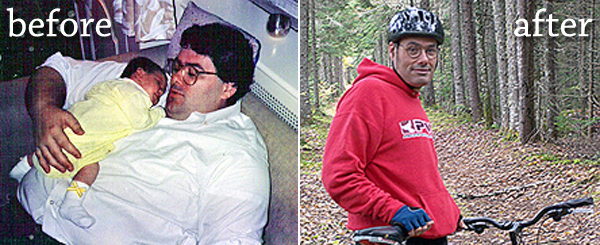
by guest blogger Pam Peeke, MD, MPH, FACP, best-selling author and expert on health, fitness, and nutrition
Don’t believe the naysayers who tell you that it’s all but impossible to drop that excess weight and keep it off. I’ll tell you what to believe: the real science stemming from The National Weight Control Registry (NWCR), a well-known ongoing research study examining the lives and habits of more than 10,000 people who are referred to as the “successful losers.”
Drs. James Hill and Rena Wing established this unique and remarkable study in 1994 to understand what it takes to achieve long-term successful weight-loss maintenance. They determined that weight-loss processes and maintenance were different enough to warrant a closer examination of the critical characteristics of people who have defied the status quo of short-term weight loss followed by quick regain. People like Michael Prager, a journalist and author of the bestseller Fat Boy Thin Man, who detailed his extraordinary journey shedding 155 pounds and sustaining that achievement for two decades.

If you look at Michael’s before and after pictures, first you see a dad glowing with love for his infant. Then, in the second, there’s a man on his bike, smiling with pride, embracing the adventure of life. The best caregiver is a healthy caregiver, and those two pictures capture a trajectory so similar to many of the participants in the NWCR, as well.
Here are highlights of tips blending NWCR’s scientific findings and Michael’s personal story to enlighten and help guide you to sustainable-weight-loss success:
1. Always adapt. People attempting long-term weight loss have tried everything. From diet fads to exercise boot camps to every imaginable self-help book, extreme makeover show, or rehab center—the majority of successful maintainers have been there and done it. In the end, they simply customized a way of living that worked for them. Cherry-picking from their past experiences and incorporating new advice, they used trial and error to figure out what worked best. Individualizing based upon your unique life needs is key. As is continually reevaluating new changes in your life to continue customizing to fit those needs. In essence, weight-loss maintainers continually modify and adjust to sustain success.
2. Be mindful of every mouthful. Data shows that the majority of those successful with long-term maintenance are not following a branded diet. They’ve studied themselves and realize what works and what doesn’t. Someone with a family or personal history of diabetes, for instance, has to pay much more attention to controlling blood glucose levels, and therefore carbohydrate intake.
Like so many of the NWCR participants, Michael found nutrition experts and resources to help guide him as he created a way to eat that produced sustainable results. He found that certain food products, such as refined sugar and grain, just didn’t work for him. He realized in his journey that he demonstrated addictive eating behaviors. In learning to control his food addiction, it was critical to identify those foods that increased cravings and bingeing.
Here are two questions I share with everyone to help people become aware of which products (food/beverage) are not contributing to their health and wellness. If the answer to either or both is “yes,” then that product does not work for you:
- Will eating this food result in a feeling of loss of control?
- After eating this food, will I feel shame, blame and guilt?
3. Get a plan and the support to keep it going. As I like to say, “If you fail to plan, you plan to fail.” The simple fact is that you cannot wing it if you want to both shed excess pounds and keep them off. The vast majority of the most successful folks do the work to create a plan and then make a commitment to stick to it. Some people keep a journal to help them stay accountable. Others write down a commitment and sign it, keeping this document in plain site as a constant reminder of it. Still others find a wide range of groups and communities of like-minded folks to help them stay on track. They change up their “tribal members” to include those who are most supportive and walk the talk of healthy living. Michael works closely with the Food Addiction Institute, continually learning and sharing more. You can start your own revolution, as Michael has done with his blogging and the followers he has helped to mentor.
4. Keep movin’ it. On average, the NWCR participants are expending about 400 calories of energy through physical activity every day, for a total of about 2,800 calories per week. None of the participants sits around adding up all of these calories and obsessing about them. Instead, it’s the researchers who have done the number crunching, noting that walking is the favored form of activity and that it’s been incorporated into most everyone’s life. Michael cycles and stays active to maintain his 20 years of recovery and maintenance. Everyone cross-trains to some extent, and weight training is also important for long-term success.
5. Get a life. Finally, an outstanding characteristic of members of the NWCR group is that they watch less than 10 hours of TV per week. The majority of them admit to having once lived life vicariously sitting in front of the tube, which was often a trigger to mindlessly overeat, as well. By limiting or even eliminating tube time, a royal win-win awaits. On the one hand, when you’re not staring at the television, you’re living the life you deserve, filling it with memories and experiences. On the other, by ditching the TV hours, you’re away from the powerful trigger that can send you zombie-walking into the kitchen, foraging in the fridge, preparing for another binge. Lose the remote. Get a life.
Michael looks at his own life journey and sustained-weight-loss achievement with these wise words to anyone seeking advice for their own struggles: “If I symbolize anything, it is that vast change is possible. I would never have said that before I embarked on this path, and I continued to scoff at the idea well into my recovery. But after 20 years, I accept it without the slightest hesitation.”
 Pamela Peeke, MD, MPH, FACP, is a Pew Scholar in nutrition and metabolism, assistant professor of medicine at the University of Maryland, and a fellow of the American College of Physicians. A triathlete and mountaineer, she is known as “the doc who walks the talk,” living what she’s learned as an expert in health, fitness, and nutrition. Her current research at the University of Maryland centers on the connection between meditation and overeating. She is the author of many best-selling books, including Fight Fat after Forty. Her newest book is the New York Times bestseller The Hunger Fix.
Pamela Peeke, MD, MPH, FACP, is a Pew Scholar in nutrition and metabolism, assistant professor of medicine at the University of Maryland, and a fellow of the American College of Physicians. A triathlete and mountaineer, she is known as “the doc who walks the talk,” living what she’s learned as an expert in health, fitness, and nutrition. Her current research at the University of Maryland centers on the connection between meditation and overeating. She is the author of many best-selling books, including Fight Fat after Forty. Her newest book is the New York Times bestseller The Hunger Fix.




Good info in this article. What I find depressing about just about every article I read for diet and disease prevention tells us to exercise, exercise, exercise.
What about those of us who can’t exercise? What about those of us who take weight gaining meds?
I am 30 lbs. overweight and see no chance of ever losing this weight.
I’m not able to do a lot of exercise, but I do walk at least 30 minutes a day. I take the stairs unless I’m carrying something heavy. And I’ve lost weight slowly by eating 1/3 less each day. By eating just 1/3 less I don’t feel deprived nor hungry. By losing slowly, there’s less chance of gaining it all back along with 10 more lbs. I’ll never get completely rid of my waist line as that is where the weight went on first and where it doesn’t want to leave, but just being my normal weight for my height again is great for my health. Patience and never giving up is my key to getting slowly to my healthy weight again.
I am sure that vast majority of overweight people would be able to describe the right path to the correct weight. Anyway they fail in following it. Our brain has been evolving for too long in an environment where food equaled survival. And laziness is just a way how to spare energy needed for survival too. In our current environment we have to be able to fight against our own brains, as the environment has changed a lot and therefore the instructions sent by our brains are not fully correct. And it takes a strong will to win…